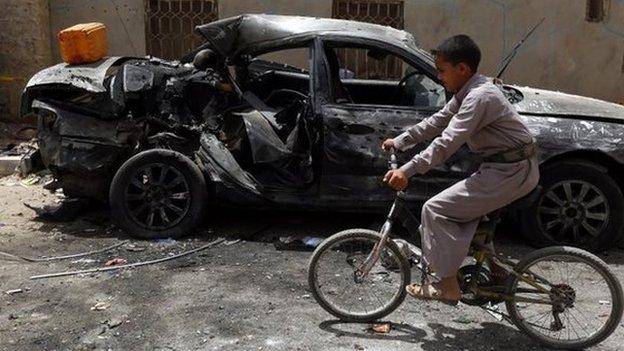Saudi Arabia launches air strikes in Yemen
- Published
The BBC's Jeremy Bowen: "The Gulf states will find that victory in Yemen's wars do not come easily or quickly"
A coalition led by Saudi Arabia has launched air strikes against Shia Houthi rebels in Yemen, saying it is "defending the legitimate government" of President Abdrabbuh Mansour Hadi.
Saudi jets targeted Houthi positions in the capital Sanaa overnight, along with missile batteries and warplanes.
Mr Hadi fled to an undisclosed location after rebel forces neared his refuge in the southern city of Aden on Wednesday.
A Houthi official warned the coalition that it risked provoking a wider war.
Shia power Iran, which Sunni-ruled Saudi Arabia accuses of backing the rebels, also demanded an immediate halt to the strikes, which it said violated Yemen's sovereignty.
"We will make all efforts to control [the] crisis in Yemen," Iranian Foreign Minister Mohammad Javad Zarif said, according to the Isna news agency.
A conflict that pulls in regional powers could disrupt global oil supplies, and the price of Brent crude rose almost 6% after the strikes began.
Homes destroyed
The Saudi ambassador to the US announced the start of "Operation Storm of Resolve" at a news conference in Washington on Wednesday night.
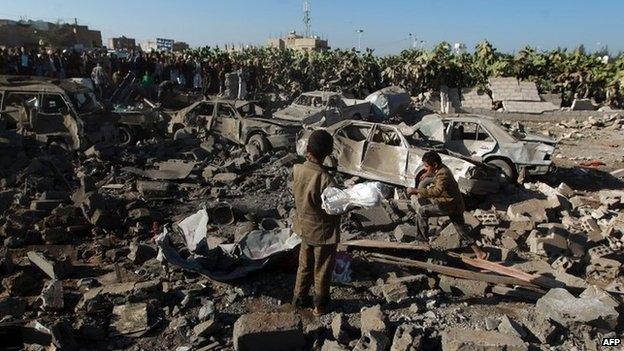
The damage caused by the Saudi-led coalition air strikes in Sanaa was clear to see on Thursday morning
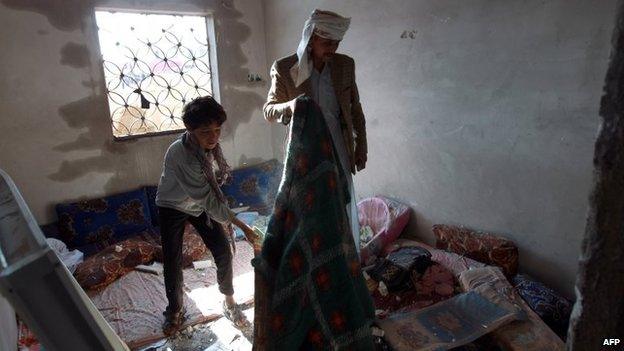
Rescue workers said at least 13 civilians were killed when homes near the airport were destroyed
Adel al-Jubair said it would begin with air strikes, but vowed: "We will do whatever it takes in order to protect the legitimate government of Yemen from falling."
Saudi-owned Al-Arabiya TV reported that the UAE, Bahrain, Kuwait, Qatar, Jordan, Morocco and Sudan were sending aircraft, while Egypt, Jordan, Sudan and Pakistan were ready to take part in any ground offensive. Oman is the only Gulf Arab state not participating.
The US said it was providing "logistical and intelligence support".
As Mr Jubair spoke, huge explosions were heard in Sanaa, as warplanes attacked the al-Dulaimi air base near the international airport and other locations. Rebel fighters responded by firing anti-aircraft guns and missiles.
Security officials told the Associated Press that the targets included a missile base controlled by the Houthis, as well as a nearby fuel depot. A camp for a US-trained special forces unit loyal to ousted former President Ali Abdullah Saleh, who is backing the rebels, was also hit.

At the scene: BBC reporter near Sanaa
Following the overnight strikes, people rushed to the military sites which had been targeted to check the level of destruction.
Dozens of families meanwhile have fled Sanaa to safe places outside the city, fearing new air strikes.
There are long queues of cars at petrol stations amid fears of fuel shortages, and many shops and firms have shut. School and university classes in Sanaa have been suspended for the time being.
Some Sanaa residents see the air strikes as a way of ending the crisis, which they blame on the Houthis for taking over their city.
However angry Houthi followers and supporters of the former president called for protests against the attacks.
On social media, Houthi supporters have been urging them to keep advancing to the border and storm Saudi Arabia, and to blockade the strategic Bab al-Mandab Strait in the Red Sea.

A civil defence source told the AFP news agency that 13 civilians were killed when seven homes near the al-Dulaimi air base were destroyed. The Houthis' al-Masirah TV quoted the health ministry as putting the death toll at 18.
There were also reports of strikes in the Houthis' northern heartland of Saada province, which borders Saudi Arabia, as well as in Aden and the third city, Taiz.
An official also told the AFP news agency that 18 people were killed in clashes between rebel fighters and soldiers and militiamen loyal to Mr Hadi in southern Yemen on Thursday.

'Sound of reason'
Yemen's foreign minister, Riad Yassin, told the Saudi TV channel al-Hadath that the air strikes were welcome, adding: "I hope the Houthis listen to the sound of reason. With what is happening, they forced us into this."
President Hadi called on the Gulf Co-operation Council (GCC) and the Arab League to intervene last week after the presidential palace in Aden was twice targeted by unidentified warplanes and rebels and pro-Saleh troops seized Taiz.
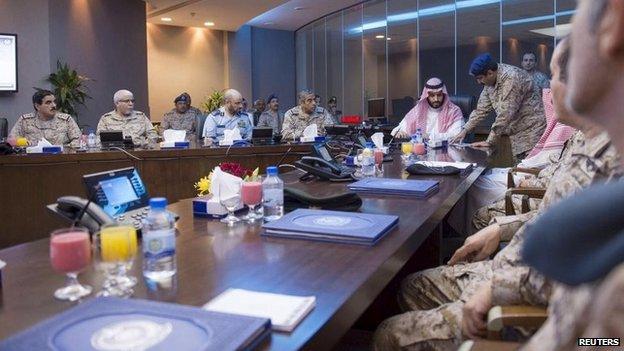
Saudi Defence Minister Prince Mohammed bin Salman (C) was briefed by officers on the operation
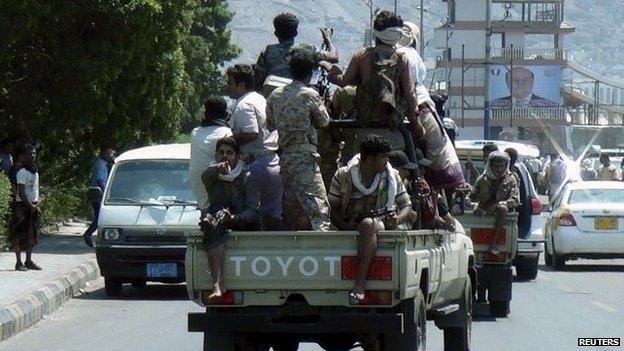
Militiamen loyal to President Abdrabbuh Mansour Hadi have been unable to stop the Houthi advance
Mr Hadi took refuge in Aden last month after fleeing Sanaa, where he had been under house arrest since the rebels took full control of the capital in January.
The president's appeal for help became more urgent on Wednesday when the rebels overran al-Anad air base, a large military facility that is only 60km (37 miles) north of Aden.
Mr Hadi was subsequently moved to a "secure location" after another air raid on his palace and the capture of Aden's international airport by pro-Saleh police.
Senior aides insisted that he remained in the city and had no plans to leave, but security and port officials later told the Associated Press that he had left by boat.
The Houthis have said their aim is to replace Mr Hadi's government, which they accuse of being corrupt, and to implement the outcomes of the National Dialogue that was convened when Mr Saleh was forced to hand over power in 2011 following mass protests.

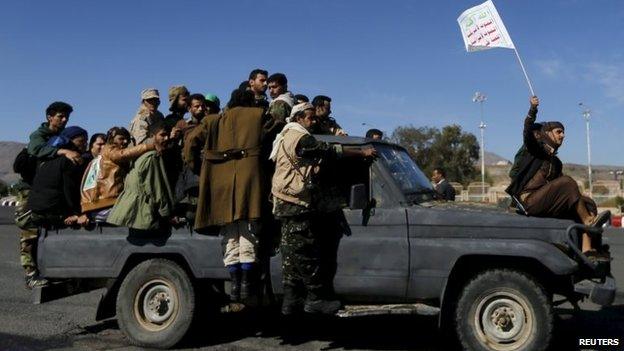
The Houthis have said their aim is to replace Mr Hadi's government, which they accuse of corruption
The Houthis: Zaidi Shia-led rebels from the north, who seized control of Sanaa last year and have since been expanding their control
President Hadi: Backed by military and police loyalists, and by militia known as Popular Resistance Committees, he is trying to fight back against the rebels from his stronghold in the south
Al-Qaeda in the Arabian Peninsula: Seen by the US as the most dangerous offshoot of al-Qaeda, AQAP opposes both the Houthis and President Hadi.
Islamic State: A Yemeni affiliate of IS has recently emerged, which seeks to eclipse AQAP
Yemen crisis: An Iranian-Saudi battleground?

- Published14 April 2023
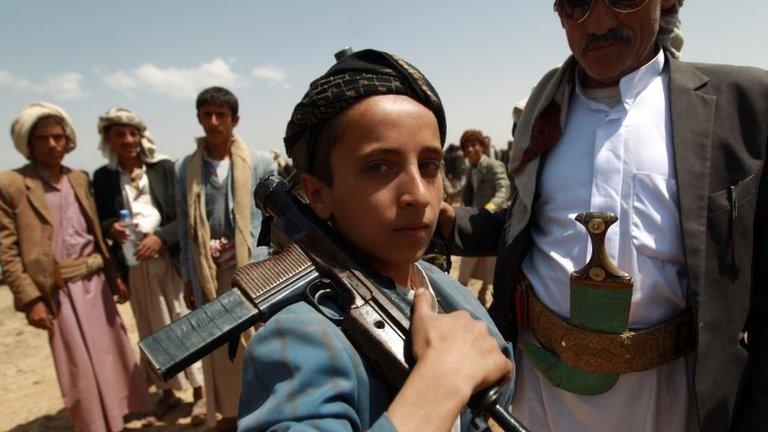
- Published22 March 2015
